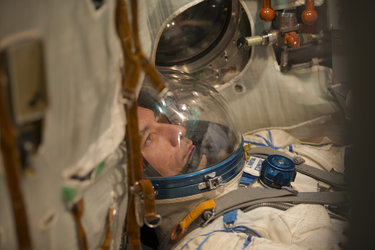Everyday life in space
The International Space Station operates with a six-person crew performing scientific experiments, support work, maintenance and repair.

Luca’s first two weeks on the Station are spent getting used to living and working in microgravity. His body undergoes many changes as it adapts to being weightless. Astronauts learn hands-on how to work and live on the Space Station. Years of theory and practice prepared him for this moment. Every aspect of Station operations was thoroughly examined beforehand on the ground.
During weekdays, astronauts work six hours with an hour and a half spent exercising. Their time is carefully planned, with each task being given a specific time to complete. Exercise is important for astronauts to keep fit and counteract the effects of living in space.
Housekeeping is reserved for the weekends. Keeping the space laboratory clean and tidy is important for safety and efficiency but harder than on Earth because unsecured objects float away and are easily lost.
At the weekend, the astronauts have more spare time to enjoy the view from ESA’s Cupola observatory module, phone family and friends, and perform voluntary science. To make sure the crew are never bored, scientists on Earth develop a number of ‘back-pocket’ experiments that can be performed with little set-up time.
Every week, Luca talked to his flight surgeon on Earth to discuss his health and fitness and any other problems or concerns he had.

An astronaut has eight hours available to sleep each day. All six crewmembers sleep at the same time to foster a calm environment.
During his stay on the Station Luca had day and night support from the European Control Centre in Oberpfaffenhofen, Germany. A dedicated team is always on standby to explain procedures, instruct, help and inform.















 Germany
Germany
 Austria
Austria
 Belgium
Belgium
 Denmark
Denmark
 Spain
Spain
 Estonia
Estonia
 Finland
Finland
 France
France
 Greece
Greece
 Hungary
Hungary
 Ireland
Ireland
 Italy
Italy
 Luxembourg
Luxembourg
 Norway
Norway
 The Netherlands
The Netherlands
 Poland
Poland
 Portugal
Portugal
 Czechia
Czechia
 Romania
Romania
 United Kingdom
United Kingdom
 Slovenia
Slovenia
 Sweden
Sweden
 Switzerland
Switzerland































